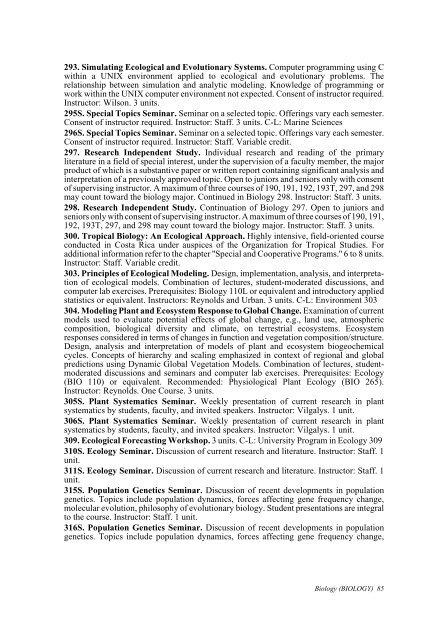2005-06 - Office of the Registrar - Duke University
2005-06 - Office of the Registrar - Duke University
2005-06 - Office of the Registrar - Duke University
You also want an ePaper? Increase the reach of your titles
YUMPU automatically turns print PDFs into web optimized ePapers that Google loves.
293. Simulating Ecological and Evolutionary Systems. Computer programming using C<br />
within a UNIX environment applied to ecological and evolutionary problems. The<br />
relationship between simulation and analytic modeling. Knowledge <strong>of</strong> programming or<br />
work within <strong>the</strong> UNIX computer environment not expected. Consent <strong>of</strong> instructor required.<br />
Instructor: Wilson. 3 units.<br />
295S. Special Topics Seminar. Seminar on a selected topic. Offerings vary each semester.<br />
Consent <strong>of</strong> instructor required. Instructor: Staff. 3 units. C-L: Marine Sciences<br />
296S. Special Topics Seminar. Seminar on a selected topic. Offerings vary each semester.<br />
Consent <strong>of</strong> instructor required. Instructor: Staff. Variable credit.<br />
297. Research Independent Study. Individual research and reading <strong>of</strong> <strong>the</strong> primary<br />
literature in a field <strong>of</strong> special interest, under <strong>the</strong> supervision <strong>of</strong> a faculty member, <strong>the</strong> major<br />
product <strong>of</strong> which is a substantive paper or written report containing significant analysis and<br />
interpretation <strong>of</strong> a previously approved topic. Open to juniors and seniors only with consent<br />
<strong>of</strong> supervising instructor. A maximum <strong>of</strong> three courses <strong>of</strong> 190, 191, 192, 193T, 297, and 298<br />
may count toward <strong>the</strong> biology major. Continued in Biology 298. Instructor: Staff. 3 units.<br />
298. Research Independent Study. Continuation <strong>of</strong> Biology 297. Open to juniors and<br />
seniors only with consent <strong>of</strong> supervising instructor. A maximum <strong>of</strong> three courses <strong>of</strong> 190, 191,<br />
192, 193T, 297, and 298 may count toward <strong>the</strong> biology major. Instructor: Staff. 3 units.<br />
300. Tropical Biology: An Ecological Approach. Highly intensive, field-oriented course<br />
conducted in Costa Rica under auspices <strong>of</strong> <strong>the</strong> Organization for Tropical Studies. For<br />
additional information refer to <strong>the</strong> chapter ''Special and Cooperative Programs.'' 6 to 8 units.<br />
Instructor: Staff. Variable credit.<br />
303. Principles <strong>of</strong> Ecological Modeling. Design, implementation, analysis, and interpretation<br />
<strong>of</strong> ecological models. Combination <strong>of</strong> lectures, student-moderated discussions, and<br />
computer lab exercises. Prerequisites: Biology 110L or equivalent and introductory applied<br />
statistics or equivalent. Instructors: Reynolds and Urban. 3 units. C-L: Environment 303<br />
304. Modeling Plant and Ecosystem Response to Global Change. Examination <strong>of</strong> current<br />
models used to evaluate potential effects <strong>of</strong> global change, e.g., land use, atmospheric<br />
composition, biological diversity and climate, on terrestrial ecosystems. Ecosystem<br />
responses considered in terms <strong>of</strong> changes in function and vegetation composition/structure.<br />
Design, analysis and interpretation <strong>of</strong> models <strong>of</strong> plant and ecosystem biogeochemical<br />
cycles. Concepts <strong>of</strong> hierarchy and scaling emphasized in context <strong>of</strong> regional and global<br />
predictions using Dynamic Global Vegetation Models. Combination <strong>of</strong> lectures, studentmoderated<br />
discussions and seminars and computer lab exercises. Prerequisites: Ecology<br />
(BIO 110) or equivalent. Recommended: Physiological Plant Ecology (BIO 265).<br />
Instructor: Reynolds. One Course. 3 units.<br />
305S. Plant Systematics Seminar. Weekly presentation <strong>of</strong> current research in plant<br />
systematics by students, faculty, and invited speakers. Instructor: Vilgalys. 1 unit.<br />
3<strong>06</strong>S. Plant Systematics Seminar. Weekly presentation <strong>of</strong> current research in plant<br />
systematics by students, faculty, and invited speakers. Instructor: Vilgalys. 1 unit.<br />
309. Ecological Forecasting Workshop. 3 units. C-L: <strong>University</strong> Program in Ecology 309<br />
310S. Ecology Seminar. Discussion <strong>of</strong> current research and literature. Instructor: Staff. 1<br />
unit.<br />
311S. Ecology Seminar. Discussion <strong>of</strong> current research and literature. Instructor: Staff. 1<br />
unit.<br />
315S. Population Genetics Seminar. Discussion <strong>of</strong> recent developments in population<br />
genetics. Topics include population dynamics, forces affecting gene frequency change,<br />
molecular evolution, philosophy <strong>of</strong> evolutionary biology. Student presentations are integral<br />
to <strong>the</strong> course. Instructor: Staff. 1 unit.<br />
316S. Population Genetics Seminar. Discussion <strong>of</strong> recent developments in population<br />
genetics. Topics include population dynamics, forces affecting gene frequency change,<br />
Biology (BIOLOGY) 85









